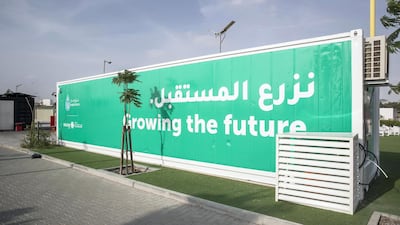The Abu Dhabi Government has launched a Dh1 billion-programme to support the establishment of agricultural technology companies in the emirate, as part of the Ghadan 21 three-year stimulus package, announced last year.
The "AgTech" initiative is part of an accelerator programme to establish the UAE's capital as a global centre for agricultural innovation in desert environments. The project is being led by the Abu Dhabi Investment Office, which was set up last year to drive foreign investment. It was formalised under a law enacted in January.
AgTech includes a rebate on research by companies and development expenses equivalent to up to 75 per cent of the total R&D cost – subject to "availability and commercial conditions", Abu Dhabi Investment Office said on Monday.
“Adio’s objective is to create clear and specific investment opportunities for domestic and foreign investors aligned with Abu Dhabi’s economic priorities,” said Elham Al Qasim, acting chief executive of Adio.
“These opportunities can be in the form of public-private-partnerships or sector incentives such as the AgTech package we have launched, which will not only create a vibrant AgTech ecosystem, but also stimulate the agriculture industry in Abu Dhabi,” she said.
Under the programme, the Government will offer a series of cash and non-cash incentives to make it easier for local and global AgTech companies to set up and expand their operations in the coming years.
"In addition to the generous AgTech packages on offer, Abu Dhabi also offers numerous benefits to businesses and innovators including globally competitive tax rates, world-class infrastructure, the ability to handle high-volume commodities, inexpensive energy sources and favourable tariff structures," said Ms Al Qasim.
The packages will be awarded to local and international companies that develop technologies to support precision farming and agriculture robotics, bioenergy and indoor farming.
These three sectors are particularly aided by Abu Dhabi's climate and environment, as they require plentiful land, natural heat and abundant sunlight, said Adio.
“The incentive packages will enable the creation of advanced AgTech knowledge in Abu Dhabi and help to solve traditional farming challenges,” said Saif Al Hajeri, chairman of the Abu Dhabi Department of Economic Development.
“This will not only benefit the UAE, but also other nations across the world with arid conditions,” he said. “Our aim is to position Abu Dhabi as a beacon for innovation in agriculture technologies applied to desert environments.”
The UAE, like other GCC countries, is looking to expand its activities in the burgeoning agribusiness, or agricultural production sector, to ramp up food security.
The Emirates wants to develop the sector at home and overseas. In October, the country signed a deal with Uganda to establish a 2,500-hectare agricultural free zone to enhance food security in the UAE.
The agreement will allow private companies from the Emirates to invest in agricultural production and development in the African country.
Ghadan 21, which translates as “Tomorrow 21” in English, is the banner name for a
series of reforms to stimulate investment, create jobs, encourage innovation, improve the quality of life, as well as cement the UAE as a growing world power.
The disbursement of the Dh50bn package will be spread over three years.

